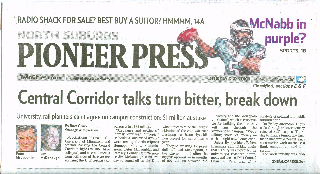… in the Minneapolis Star Tribune notes that the most charitable description of what’s been going on at the clubby University of Minnesota medical school would be “bizarre.”
After handing the University of Minnesota an all-or-nothing alcohol sales policy for TCF Bank Stadium last year, the Legislature is considering allowing the University to choose where exactly to sell alcohol in its sports facilities, as was originally planned.
Controversial amendments to a liquor bill would change the requirements regarding alcohol sales on licensed, University-owned property, such as the stadium or Mariucci and Williams arenas.
The stringent requirements were added last session. Prior to that, liquor sales were left to the University’s discretion and served in premium seating areas only.
Sen. James Metzen, DFL-South St. Paul, introduced the amendment last week, and the Senate Higher Education Committee will hear the bill Tuesday.
[Senator Metzen is the brother of former Regent Dr. David Metzen, who served for many years at the unofficial regent for athletics at the U of M. Booze for the suit(e)s was his brainchild.]
Sen. Sandra Pappas, DFL-St. Paul, the committee’s chairwoman, said she supports the amendment and said the University’s budget troubles make it likely the bill will be passed by her committee.
“We’re in a position of having to cut the University’s budget,” Pappas said. “We should not be also cutting their ability to raise money in other ways.”
[Senator Pappas, why not sell alcohol, in moderation, to all of legal age. This would allow the U to raise money - and a lot of it.]
But critics of the bill, including the chairman of the House Higher Education committee, have challenged the logic of framing the debate as an economic issue.
Rep. Tom Rukavina, DFL-Virginia, Minn., led the charge that got the original restrictions in place last session. He said he heard rumors that a similar bill might be introduced in the House this session and decried the University as “elitist” for allowing only premium ticketholders to drink.
University officials do not have a formal position on the legislation this session, but administrators have opposed allowing alcohol sales throughout the stadium since the debate began, University spokesman Dan Wolter said in an e-mail.
University police also weighed in against it, citing concerns about the effect alcohol could have on a crowd.
In June, following the original bill’s passage, the University’s Board of Regents prohibited the sale of alcohol at the stadium and both arenas, despite the expected loss of revenue attached to the decision.
Wolter said the brunt of revenue losses doesn’t stem from the lack of actual alcohol sales, but from un-renewed premium seats and losing suite holders, as well as the resulting lower prices used to spur demand.
Wolter said it is estimated that the University faces a yearly loss ranging from $1 million to $2 million in terms of premium seating at TCF Bank Stadium and Mariucci and Williams arenas. Losses related to actual alcohol sales only add up to about $200,000 yearly, he said.
[Do you mean from the sale to the suits or the whole stadium? Revenue from the whole stadium would be at least a million dollars and probably more. This information should be fairly easy to obtain since alcohol was sold at Gopher games in the Metrodome.]
Under the bill’s provisions, the renewed income from alcohol sales would be set aside for merit-based scholarships for University athletes.
[Merit? Please explain? Are they going to donate these millions of dollars that will be generated from making premium seats available, or just the profit on the relatively small amount of money that booze for the suits will generate? We all know the answer to that one. ]










